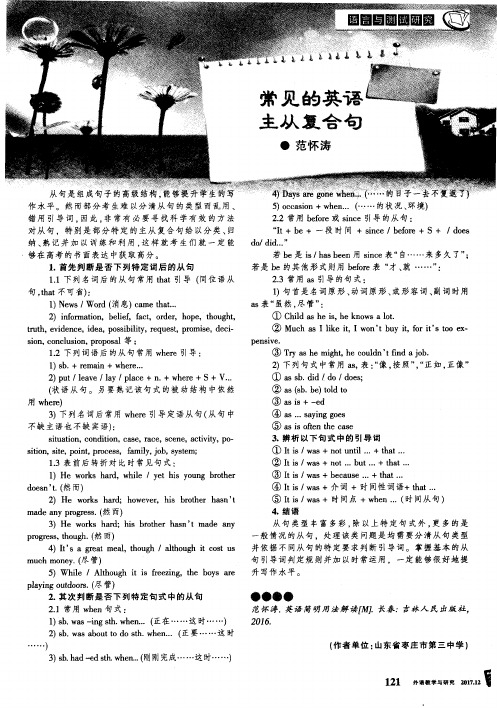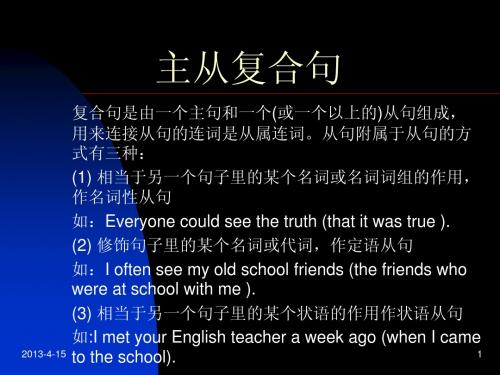(完整word版)英语主从复合句大全
主从复合句例句

主从复合句例句主从复合句是英语写作中常见的一种句子结构。
它由一个主句和一个或多个从句组成,从句在句中充当主句的补充、解释或限制等作用。
下面是一些例句,以帮助您更好地理解主从复合句的用法。
1. Although it was raining, we decided to go for a walk.虽然下雨,但我们决定去散步。
这个例句中,从句“Although it was raining”起到补充说明从句“we decided to go for a walk”的作用。
2. I will wait here until you come back.在你回来之前,我会在这里等待。
这个例句中,从句“until you come back”起到限制主句“I will wait here”的作用。
3. She always carries an umbrella in case it rains.她总是带把伞以防下雨。
这个例句中,从句“in case it rains”起到解释主句“She always carries an umbrella”的作用。
4. My brother, who is a doctor, works at the local hospital.我的弟弟是一名医生,他在当地医院工作。
这个例句中,从句“who is a doctor”起到说明主句“My brother works at the local hospital”的作用。
5. After I finish my work, I will go to the gym.我完成工作后,我会去健身房。
这个例句中,从句“After I finish my work”起到补充说明主句“I wil l go to the gym”的作用。
6. The book that I am reading is very interesting.我正在读的那本书很有趣。
常见的英语主从复合句

p og r r e s s , t h o u g h . ( 然 而)
4 . 结 语
m a d e a n y p r o g r e s s . ( 然 而)
3 1 He w o r k s h a r d ;h i s b r o t h e r h a s n’ t ma d e a n y
从句 类型丰 富多彩, 除以上特定 句式外 , 更 多 的是
s i t ua t i o n,c o nd i t i o n ,c a s e ,r a c e ,s c e ne ,a c t i vi t y,p o—
④a s …s a y i n g g o e s
⑤ a s i s o t f e n t h e c a s e
t r u t h , e v i d e n c e , i d e a ,p o s s i b i l i t y , r e q u e s t , p r o mi s e ,d e c i -
若b e是 i s / h a s b e e n用 s i n c e表 “ 自… … 来 多久 了” : 若是 b e的其 他 形 式 则用 b e f o r e 表 “ 才、 就 ……” : 2 . 3常用 a s 引导的句式: 1 ) 句首是名词原形、 动词 原 形 、 或形容词 、 副词时用 a s 表“ 虽然 , 尽管 ” :
1 1 He wo r k s h a r d ,wh i l e /y e t h i s y o u n g b r o t h e r
② I t i s , w a s +n o t …b u t … +t h a t …
⑧ I t i s / w a s +b e c a u s e… +t h a t …
高中英语复合句最全最牛总结

英语基础概念:主句+从句=复合句1有关概念由一个主句和一个或一个以上从句构成的句子叫做复合句。
所谓主句,就是在复合句中起统领作用的句子,它是全句的主体,通常可以独立存在;而从句则是复合句的一个句子成分,不能独立存在。
如:You’ll feel better after you take the pills. 吃完药丸后你会感到好一些。
The police learned that he wasn’t there at that time. 警察获知他那时不在场。
这两句都是复合句,第一句的主句是You’ll feel better,从句是after you take the pills,由after引导,在整个复合句中用作状语,表示时间;第二句的主句是The police learned是主句,that he wasn’t there at that time是从句,由that引导,在整个复合句中用作宾语。
注意,英语的复合句不是简单句的反面,不要将它误解为“复杂句”。
事实上,英语的简单句有时也可以比较“复杂”,而复合句也可以比较“简单”。
如:He stopped because he was tired. 他停下来是因为他累了。
这个句子比较“简单”,却是一个典型的复合句,其中的he stopped是主句,because he was tired是从句,在复合句中用作状语,表示原因。
2从句的分类前面我们说到从句是整个复合句的一个句子成分,它可以用作主语、宾语、定语、状语等。
一般说来,一个从句在复合句充当什么成分我们就叫它为什么从句——从句在复合句用作主语,我们就叫它为主语从句;从句在复合句用作宾语,我们就叫它为宾语从句;从句在复合句用作状语,我们就叫它为状语从句;等等。
如:He answered that he knew nothing about it. 他回答说他不知情。
The trouble is that I have lost his address. 麻烦的是我把他的地址丢了。
主从复合句

初中英语语法—主从复合句主从复合句由一个或一个以上的从句构成,主句为句子的主体,从句不能独立,只用作句子的一个成分.主从复合句主要包含定语从句,状语从句和名词性从句.一、宾语从句宾语从句在主从复合句中起宾语的作用 既可作谓语动词的宾语 也可作介词、非谓语动词 动词不定式、动名词、分词 的宾语。
引导宾语从句的关联词的用法①陈述意义的宾语从句 由从属连词that引导 that本身无义 在口语或非正式文体中常可省略。
E.g. She said (that) she would come.②一般疑问意义的宾语从句由从属连词whether或if引导 如果强调“究竟是…还是不…” 可在whether后加not e.g. Can you tell me if/whether you can come here tomorrow? I’ll wait to see whether your words are true or not.③特殊疑问意义的宾语从句 由连接代词who whom whose what which和连接副词when where why how引导 宾语从句中的语序为陈述式语序。
E.g. Please tell me when you were born.学习宾语从句应该注意的几个问题①当主句谓语动词是think、believe、imagine等时 后面的宾语从句要表示否定意义时 要通过主句的否定式来实现 即否定主句中的动词。
E.g. 我认为他明天不会来。
wrong I think he will not come tomorrow. right I don’t think he will come tomorrow.②某些形容词后面也可有宾语从句,这些形容词有:sure、certain、glad、pleased、happy、afraid、surprised、satisfied等。
E.g. I’m sure you can learn English well.二、状语从句状语从句在主从复合句中修饰主句中的动词、形容词或副词等。
主从复合句

此结构在形式上同it引导的形式主语结构,很难区分。只 要将强调结构:“It is/was…that…” 拿掉,句子仍然成立,句意不变,便可确定为强调结构, 否则为主语从句,试比较: It was this morning that they helped me. (去掉强调结 构,句子仍然成立不变) It is important that we should make full use of our time. (去掉强调结构,句子不成立)
1.名词性从句
名词性从句包括宾语从句、主语从句、表语从句和同位 语从句,主要有连接词that, whether, if, what, who, whom, whose, which, when, where, why, how等引导, 如: He wants to know where we should have the meeting. It is not yet decided where we should have the meeting. The question is where we should have the meeting. I have no idea where we should have the meeting. 以上四句为宾语从句,主语从局,表语从句和同位语从 句。
2010-10-14 13
(7) which和as引导定语从 句的用法区别
which和as都可以引导非限制性定语从句,代表前面整个 主句的内容,在定语从句中作宾语或主语,不用的是as 引导的定语从句除放在句末、句中外,还置于句首,需 which不可置于句首,另外,as常用于“such...as”, “the same...as”结构中,如: As we natural, he married her. He, as is clear from his manner, is a teacher. This is such a pen as I lost yesterday. This is the same pen as I lost yesterday.
主从复合句英语

主从复合句英语Title: The Importance of Cultivating Reading HabitsAs an English professor, I believe that cultivating reading habits is paramount to becoming a competent learner and a successful individual. Through reading, we gain knowledge, broaden our perspectives, and improve our critical thinking skills.Reading encompasses more than just textbooks and academic journals. It should span across genres and mediums, from fiction novels to news articles, from ebooks to physical copies. By embracing diverse materials, we can expand our understanding of the world around us and explore different viewpoints.Moreover, reading allows us to appreciate language and literature. It enhances our communication skills and exposes us to new vocabulary and grammar structures. Avid readers tend to have a richer and more varied language repertoire, making them more effective communicators.Perhaps most importantly, reading fosters individual growth. It encourages selfreflection and empathy, allowing us to connect withcharacters, themes, and ideas we encounter in literature. Through reading, we can gain a deeper understanding of ourselves and others, ultimately leading to personal growth and development.Therefore, I urge everyone, regardless of their backgrounds and professions, to cultivate a reading habit as part of their daily routine. Reading is an investment in oneself that pays great dividends in all aspects of life.。
(完整版)经典长难句必背汇总
经典长难句必背汇总1、主从复合句 When a new movement in art attains a certain fashion, it is advisable to find out what its advocates are aiming at, for, however farfetched and unreasonable their principles may seem today, it is possible that in years to come they may be regarded as normal. [参考译文] 当艺术上的一项新运动达到一定流行程度时,最好先弄清该运动倡导者的目的,因为,无论他们的创作原则在今天看来多么牵强、多么荒谬,在未来这些理论有可能会被视为正常的东西。
[结构分析] 本句的主干是it is advisable to find out... for... it is possible that...,句首的When引导一个时间状语从句,句中的for... it is possible... (至句末)是一个并列分句,表示原因,其中for后面的however +形容词farfetched and unreasonable引导状语从句,表示让步。
在主干it is advisable to find out... 中,it是形式主语,后面的不定式结构to find out what its advocates are aiming at是真正的主语。
2、并列句 While talking to you, your could-be employer is deciding whether your education, your experience, and other qualifications will pay him to employ you and your "wares" and abilities must be displayed in an orderly and reasonably connected manner. [参考译文] 与你谈话时,可能成为你未来老板的人会考虑你所受的教育、你的经历和你的其他资历是否在雇佣你以后会给他带来好处。
主从复合句-完整版
主从复合句-完整版主从复合句⼀宾语从句⽤作宾语的从句叫做宾语从句。
宾语从句在句中起宾语作⽤,它可以⽤作动词的宾语,也可以做动词的宾语,也可以做介词、不定式、分词、动名词以及某些形容词(如:sure, glad, pleased, certain, afraid, surprised, satisfied 等)的宾语,宾语从句可以由连词that, whether, if;代词who, whose, what, which和副词when, where, how, why等引导。
他想他过⼏天就会好了。
I think (that) he’ll be all right in a few days.你知道他们在等谁吗Do you know who (whom) they are waiting for他问那是谁的字典。
He asked whose dictionary it was.注意⽼师说的话。
Pay attention to what the teacher said.1.宾语从句在句中的位置(1)作宾语的从句。
如:I heard that he joined the army. 我听说他参军了。
She did not know what had happened. 她不知道发⽣了什么事。
(2)作介词的宾语。
如:Our success depends upon/on how well we can cooperate with one another.我们的成功在于我们彼此能够很好的合作。
She is worried about whether her mother can come on time.她在担⼼妈妈是否能按时来。
(3)作形容词的宾语。
I’m afraid (that) I’ve made a mistake.我恐怕我犯错误了。
类似的形容词还有:anxious, aware, certain, confident, glad, proud, surprised, worried, sorry, thankful, ashamed, disappointed, pleased, hurt, satisfied等。
初中英语语法主从复合句
初中英语语法主从复合句主从复合句是指一个句子中包含一个主句和一个或多个从句。
从句是与主句含义相关的附属句,通常由连词引导。
1. 主句+从句:主句:I will go to the cinema tonight.从句:because it's my favorite movie.2. 主句+从句:主句:She is studying hard.从句:so that she can pass the exam.3. 主句+从句:主句:The teacher asked us to be quiet.从句:while she was giving a lecture.4. 主句+从句:主句:He didn't go to the party.从句:although he was invited.5. 主句+从句:主句:They watched a movie.从句:which was released last week.6. 主句+从句:主句:I don't know where he went.从句:since he didn't tell me.7. 主句+从句:主句:She wants to buy a new car.从句:because her old one broke down.在这些例子中,主从复合句的关系是主句是主要内容,而从句是对主句的补充、说明、原因或条件。
起到进一步解释主句的作用。
从句的引导词包括连词如because、so that、while、although,以及关系代词/副词如which、where、because等。
初中英语语法主从复合句
初中英语语法主从复合句主从复合句是由一个主句和一个或多个从句组成的句子。
主从复合句中的从句可以作为主句的主语、宾语、定语、状语或表语。
以下是一些常见的主从复合句结构:1. 从句作主语:- What you said is true.(你说的是真的。
)- Whether you like it or not doesn't matter.(你喜不喜欢无关紧要。
)2. 从句作宾语:- I know that he is a good student.(我知道他是个好学生。
)- She asked me where I was going.(她问我去哪里。
)3. 从句作定语:- The book that I borrowed from the library is very interesting.(我从图书馆借的书非常有趣。
)- She showed me the picture that she painted.(她给我看了她画的那幅画。
)4. 从句作状语:- Since it's raining, we will stay at home.(既然下雨了,我们就呆在家里。
)- I will call you when I arrive.(我到达时会给你打电话。
)5. 从句作表语:- His dream is that he wants to become a doctor.(他的梦想是想成为一名医生。
)- The fact is that he didn't pass the exam.(事实是他考试没通过。
)需要注意的是,从句和主句之间的关系要用适当的连词连接起来,如that, whether, while, when, because, if等。
此外,从句的动词形式和时态也要根据上下文的需要进行调整。
希望这些例句可以帮助你理解主从复合句的用法。
如果有任何问题,请随时向我提问。
- 1、下载文档前请自行甄别文档内容的完整性,平台不提供额外的编辑、内容补充、找答案等附加服务。
- 2、"仅部分预览"的文档,不可在线预览部分如存在完整性等问题,可反馈申请退款(可完整预览的文档不适用该条件!)。
- 3、如文档侵犯您的权益,请联系客服反馈,我们会尽快为您处理(人工客服工作时间:9:00-18:30)。
主从复合句主句是主体,从句只是句子的一个成分,换言之,将句子(除谓语外)的各个成分扩展开来就成了从句。
关联词分五类:疑问代词:who(whom/whose),which, what,关系代词:who(whom/whose),which, that,疑问副词:when, where, why, how关系副词:when, where, why从属连词:that (无词义),whether, if, although, afterbecause, before, when, since,as soon as, as long as只有从属连词没有句子功用,即不担任句子成分。
从句分为五类:主语从句宾语从句表语从句前三项都是名词性从句,句中作用如同名词。
一般都不用逗号,所用关联词相同:1,连词that/whether/if 2, 3, 疑问副词when /where /how /why(引导间接疑问句)定语从句状语从句一.主语从句subject clause,也可分为三种:that引导的主从/ 由连接代副词引导的主从/ what和whoever等引导的主从。
1由that引导的主从,用得最多。
(that 后面是主语)“That she became an artist may have been due to her father’s influence.”她成为画家可能是受其父亲的影响。
上面句子看着别扭陌生,换成it引导的句子就熟悉了,因为一般除强调外都后置而由it代替,有五种形式:(1)+ that 、、、It is(2)、、、It’(3)宾语) or adverbial(副词)) + that、、、’re right.It struck me that we ought to make a new plan. 我忽然想起我们应该制订一个新计划。
我从未想到或许她是在说谎(4)、、、It is said)that you was suffering from a stone in the kidney. 谣传说/据说你得了肾结石。
(5)、、、’t be that they were interested in him. 不,不,他们不可能对他有兴趣。
口语中that可以省略:显然他的话使她高兴。
Who is to be sent there hasn’t been decided.It’s clear enough what he meant.两种结构都能用,但是it结构更多,有四种形式。
why he behaved like tha t. 我不太清楚他为什么会这样做。
It’s a puzzle how life began.It doesn’t matter much where I live.该发生的事总会发生。
红色为从句What is over is over. 过去的事就过去了。
Whatever my dad did was right. 俺爹做的都是对的。
Whatever she says goes. 一切她说了算。
Whoever comes will be welcomed. 谁来都欢迎Whichever you want is yours. 你要哪个,哪个就归你。
二.宾语从句object clause.1由that引导到宾从,有时that可省略I suspected that it was a trick to get our money.我怀疑这是一个骗我们钱的圈套Who can guarantee that he’ll keep his word?谁能保证他会遵守诺言?You can depend upon it, I shall be there. 先行宾语(现行宾语中间要有逗号)你放心,我会去那里的。
I take it they have left for home.我猜想他们已经回家了。
2由连接代词或副词引导宾从Write me how you got home. 写信告诉我你怎能到家的Only you can decide who the best choice is.只有你能决定谁是最佳人选。
I wonder what you call this stuff.我想知道,你管这玩艺叫什么。
3由whether/if引导的宾从I’m wondering whether you would care to spend the evening with me. 不知道你是否愿意跟我们共度今宵。
I asked her if I might call and see her. 我问她是否可以去看她。
4由关系代词what引导的宾从Show me what you’ve bought.把你买的东西给我看看。
I could not express what I felt. 我无法表达内心的感受As a friend of yours, I want to tell you what I hear.作为你的朋友,我想把听到的事告诉你。
5作介词的宾从,其他从句这样用较少:Don’t oke your nose into探听what doesn’t concern you. 别多管闲事。
??6 whatever/whichever/whomever这类词也可引导宾从:I’ll just say whatever comes into my head.想到什么就说什么。
Buy whichever is cheapest. 买最便宜的。
Give it to whomever you like. 你愿意给谁就给谁。
三.表语从句predicative clause,有二类1由that引导的表语从句The fact is (that) she never liked him.事实是她从未喜欢过他。
His only fault is that he lacks ambition.他唯一的缺点是缺乏雄心大志。
2 由连接代/副词引导的、由关系代词型的what引导的That’s not what I meant. 这不是我的意思。
The question is who’s responsible for what has happened.问题是发生了这事该谁负责。
Times aren’t what they were.时代不同了。
That’s what I am here for.这就是我来这里的目的。
(四.定语从句attributive clause 没看!!1 定从的关联词有二:关系代词(在从句中作主/宾/定)who(whom/whose), which, that和关系副词(在从句中作状语)when, where, why等。
例如:Girl who works in restaurant is called waitress.This is Johnson, whose wife work at a department store.2 Which和that的区别:关系代词which指物,做主语和宾语。
限制性定从中作宾语时可省略。
关系代词that, 指物也指人,做主语和宾语,指物时与which相同。
There are the things that(which)you need.这些就是你要的东西。
A dictionary is a book, which gives the meaning of words. 词典是解释词义的书。
Who is the person that is working at a computer over there. 在计算机上干活的那个人是谁?3 在下列情形下,只能用that:(1)先行词是all / everything / nothing / something(有时例外用which)/ anything / little等不定代词时。
Is there anything (that) I can do for you in town?有什么事我可以在城里代你办吗?That’s all (that) I know. 我知道的就是这些。
(2)先行词为序数词所修饰时。
The first thing (that) I should do is to work out a plan. 我该做的第一件事是订个计划。
(3)先行词为形容词最高级所修饰时。
This is one of the most exciting football games (that) I have ever seen. 这是我看过的足球赛中最激烈的一场。
4限制性定从和非限制性定从:意义上可缺否,形式上有无逗号。
(1)that引导的定从大多是限制性的。
注意:非限制性定从不能使用that和关系副词why, 也不能省略任何关系副词,这类从句主要出现在书面语中。
如:This is the best film that I have ever seen.Last night I saw a very good film, which was about the Anti-Japanese War. “昨晚我看了一部很棒的电影,是关于抗日战争的”只是补充说明,翻译时多译成并列句:Sunday is a holiday, when people do not go to work. 礼拜天是假日,这一天人们不上班。
(2)非限制性定从中which/whom常可以跟of或其他介词连用。
Mr. Smith, for whom I was working, was very generous about overtime payments.史密斯先生是我的老板,她付超时工资很大方。
The buses, most of which were already full, were surrounded by an angry crowd.公共汽车大多都已满载,周围是一大群愤怒的人。
My kids, both of whom study abroad, ring me up, saying Hi, every week.我的俩孩子都在国外读书,每周给我打来电话问安。
(3)在限制性定从中,当关系代词在从句中作宾语时,大多可省略,特别是在被修饰的词为all / everything等词时。
如:That’s the only thing we can do now.这是我们现在唯一能做的事。
All you have to do is to fill out this form.你只需要填这张表就行了。
